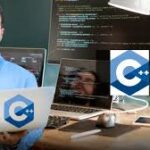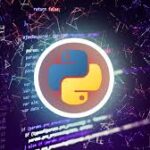C++, C++20, C++17, C++14, Classes, Pointers, STL, Templates, Multithreading, Ranges, Concurrency, OOPs, Coding Exercises
SUMMARY
This course provides a comprehensive introduction to C++, designed for both beginners and those looking to solidify their understanding of the language. By covering a wide range of topics, participants will not only learn the fundamental concepts of C++ but also delve into advanced features that enhance programming capabilities.
Key Learning Objectives
- C++ Fundamentals: Start with the core concepts of C++, including variables, data types, arithmetic operations, and basic input/output (I/O). Understanding these foundational elements is crucial for any aspiring programmer.
- Design Your Own Types: Learn to create custom data types using classes, structures, unions, and enumerations. This section empowers you to define and implement data structures tailored to your specific needs.
- Understanding Modularity: Discover how to organize and structure code effectively. This includes using namespaces, source files, and headers to keep projects maintainable. The course also introduces the C++20 Modules feature, promoting better code organization and compilation efficiency.
- Object-Oriented Programming (OOP): Gain an introduction to OOP principles, focusing on classes, constructors, member functions, and method overloading. This foundational knowledge is essential for developing scalable and maintainable software.
- Essential Operations: Demystify copy and move semantics to understand memory management better. Lay the groundwork for the Rule of Three/Five, which governs how objects manage resources.
- Harness the Power of Templates: Dive into generic programming with C++ templates, allowing for type-safe code that works across different data types without sacrificing performance.
- Concepts in C++20: Explore the new features introduced in C++20 that ensure type safety at compile-time through concepts, enabling more robust and error-free code.
- C++ Standard Library: Familiarize yourself with the extensive C++ Standard Library, which includes containers (like vectors and maps), algorithms, and utilities that simplify complex programming tasks.
- Strings and Regular Expressions: Master string operations, including the use of
string_view(introduced in C++17), and learn to leverage regular expressions for advanced string manipulation. - Familiarity with I/O Streams: Navigate the world of I/O streams to perform efficient and formatted input-output operations, enhancing user interaction with applications.
- Container Proficiency: Explore powerful container classes, such as
vector,list, andmap, and understand their uses and performance characteristics. - Algorithmic Prowess: Learn how algorithms interact with containers and iterators, equipping you with the skills to implement and optimize data processing tasks.
- C++ Utilities: Gain knowledge of useful C++ utilities, including smart pointers for automatic memory management and time/date utilities.
- Concurrency & Parallelism: Introduce yourself to concurrent programming in C++, covering threads, tasks, and synchronization mechanisms. This knowledge is increasingly important in modern software development to improve performance.
Practical Application
To reinforce learning, the course includes over 100 coding exercises and assignments. These hands-on activities enable participants to apply their newfound knowledge immediately, solidifying their understanding of concepts and enhancing their coding skills.
What you’ll learn
-
C++ Fundamentals: Grasp the core concepts including variables, data types, arithmetic operations, and basic I/O.
-
Design Your Own Types: Learn the art of defining custom types using classes, structures, unions, and enumerations.
-
Understanding Modularity: Organize and structure your code effectively using namespaces, source files, and headers. Introduction to C++20 Modules feature.
-
Dive into OOP: Get introduced to the world of Object-Oriented Programming in C++ and understand classes, constructors, member functions, and overloading.
-
Understand Essential Operations: Demystify copy and move semantics and lay the foundation for the Rule of Three/Five.
-
Harness the Power of Templates: Delve into generic programming with C++ templates, ensuring type safety without limitations.
-
Concepts (C++20) and Generic Programming: Dive deeper into ensuring type-safety at compile-time through concepts.
-
Explore the C++ Library: Get familiarized with the C++ Standard Library, from containers and algorithms to a multitude of utilities.
-
Strings and Beyond: Master string operations, string_view(C++17) and harness the power of regular expressions.
-
Familiarize with I/O Streams: Navigate the world of I/O streams for efficient and formatted input-output operations.
-
Container Proficiency: Explore powerful container classes such as vector, list, and map.
-
Algorithmic Prowess: Understand the nuances of how algorithms work with containers and iterators.
-
C++ Utilities: Equip yourself with knowledge on smart pointers, time/date utilities, and more.
-
Concurrency & Parallelism: Get started with the concurrent world of C++, learning about threads, tasks, and synchronization mechanisms.
-
100+ coding exercises and assignments to immediately apply the learned knowledge.
Conclusion
This C++ course is structured to take you from foundational knowledge to advanced programming techniques, providing a robust framework for understanding and utilizing the language effectively. Whether you’re aiming to start a career in software development or enhance your programming skills, this course offers the essential tools and knowledge to succeed in the world of C++.










